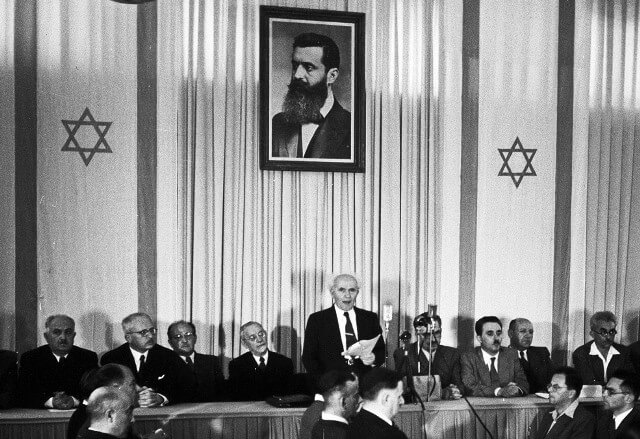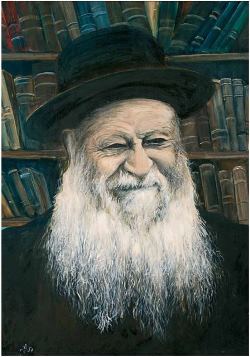
May 14, 1948. A few hours before the Sabbath, on the fifth of Iyyar, the National Council assembled in Tel Aviv to announce the establishment of the State of Israel.
The decision to establish the state was not simple. It was obvious that following the announcement, the Arab armies would launch a coordinated attack on the fledgling state, which was still in the process of organizing its military, and was equipped with inadequate and outdated weaponry. There was also a real concern that the nations of the world would not recognize the Jewish state, and the young country would remain isolated. Nevertheless, the country’s leaders took courage and declared the establishment of the State of Israel.1
For Rav Tzvi Yehudah, the founding of the State of Israel was a realization of the Biblical prophecies. Its establishment after two millennia of stateless wanderings and exile was a Divine miracle, a revelation of God’s hand in all its glory. This historical event, he taught, was not just reishit tzemihat ge'ulateinu, the “beginning of the flowering of our redemption.” This was a step in the process of redemption itself!2
The establishment of governmental agencies and structures of self-rule, the extraordinary return of Jews from around the world, the remarkable advances in settling Eretz Yisrael and developing its agriculture and economy — Rav Tzvi Yehudah saw in all of these historic events a fulfillment of the prophecies of the End of Days. He would frequently quote Rabbi Abba’s statement in Sanhedrin 98a regarding Ezekiel’s prophetic vision:
“And you, O mountains of Israel, shoot forth your branches and yield your fruit to My people Israel, because they are about to come.” (Ezek. 36:8)
Rabbi Abba commented: “There is no more manifest sign of the End of Days than this!” In other words, the agricultural flourishing of Eretz Yisrael is a sure indicator of the final redemption of Israel.
Rav Tzvi Yehudah taught that Jewish autonomy is not merely a physical concept. Independence is a spiritual concept. The freedom of the Jewish people from foreign rule is not only a political matter; it is also a religious value. He therefore perceived holiness in the State of Israel and the Israel Defense Force.
For the individual, he explained, there is an essential difference between the material and the spiritual. But for Klal Yisrael, for the entire people of Israel, these are spiritual matters. Military strength, economic prosperity, agricultural achievements — these are all part of the redemption process, because they relate, not to individuals, but to Klal Yisrael and its ability to fulfill its universal mission.
"Let Us Rejoice and Be Glad!"

Rav Tzvi Yehudah’s students observed how their teacher’s outlook was evident in his inspired elation when celebrating Yom HaAtzma'ut, Israel Independence Day.
One of his prominent disciples, Rabbi Chaim Drukman, dean of the Or Etzion yeshiva, described how the rabbi would rejoice.
Because he saw the great value of the State of Israel, our rabbi was filled with immense joy on Yom HaAtzma'ut. Whoever has not seen him rejoicing on Yom HaAtzma'ut, never saw true joy in his life. Those who merited witnessing this joy, who heard him lecture on Yom HaAtzma'ut — they saw how he wholeheartedly identified with the grandeur of the day, with its holiness and unique essence.
During his talks on Yom HaAtzma'ut, the rabbi would display such an intensity of emotions that sometimes he was moved to tears. You could sense how his spirits sang, how his soul rejoiced in “This is the day that God has made!” (Psalms 118:24) Therefore, and due to our awareness of the greatness of the hour — “Let us rejoice and be glad in it” (ibid.).
Rabbi Zalman Melamed, rabbi of Beit El and head of the yeshiva there, related:
To watch Rav Tzvi Yehudah on Yom HaAtzma'ut was a unique experience. He was completely shining, exuding light and festivity. It was enough to see him, and you felt your spirits lift up. During the Yom HaAtzma'ut celebrations and prayers at the yeshiva, he prayed at length, with great exhilaration and depth, lifting up the entire congregation with him.
Rabbi Joseph Bramson, author and lecturer, recalled:
His elation was so exceptional, his joy at this revelation of God’s deliverance of Israel. When he sang and danced, it appeared as if he was walking on the ground and holding his students’ hands like everyone else in the dance circle. But in fact, he was somewhere between heaven and earth. Every bone in his body sang out with pure gratitude to the Redeemer of Israel.
There are many who speak of the State of Israel and recognize its benefits and accomplishments. But they only see the external aspects. They have not yet perceived its inner content. Rav Tzvi Yehudah was one of the select few who grasped, in all its profound depth, the Divine event that took place when the State was established that Friday afternoon in 1948.
(Stories from the Land of Israel. Adapted from Mashmia Yeshu'ah, by Simcha Raz and Hilah Volbershtein, pp. 277-279)
1 The greatest miracle of the establishment of the State of Israel, Rav Tzvi Yehudah taught, was not the military victory of a fledgling state over the armies of five enemy countries. It was the remarkable courage to make that fateful decision and announce the establishment of an independent state.
Under intense pressure from the US State Department not to declare a state, as well as belligerent threats of the surrounding Arab countries that they would attack and destroy the Jewish community in Eretz Yisrael, this decision was not a trivial matter. The motion to declare a state only passed by a slim majority in David Ben-Gurion’s cabinet.
One member of the cabinet, Moshe Sharett, recorded his intense emotions that day.
“There was a sense of excitement combined with a stark premonition of danger, such as one might feel while standing on the edge of a precipice, poised to leap into a yawning abyss. We felt as though we were standing on a high crest, where roaring winds were brewing about us, and we needed to stand fast.”
This courageous decision, Rav Tzvi Yehudah wrote, was the true miracle of Yom HaAtzma'ut. The spirit of valor is a miracle from above, an inspired inner drive spurring one to rise to the pressing needs of the hour.
2 Rav Tzvi Yehudah’s outlook follows Maimonides’ opinion that the Messianic Era is not an era of supernatural miracles; it differs from the present era only in Israel’s sovereignty and independence “from the rule of foreign powers” (Mishneh Torah, Laws of Kings 12:2, based on the Talmudic dictum in Berakhot 34b).





